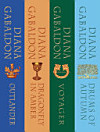Lucinda
Anthony Hope
មិថុនា 2022 · DigiCat
សៀវភៅអេឡិចត្រូនិច
198
ទំព័រ
family_home
មានសិទ្ធិ
info
reportការវាយតម្លៃ និងមតិវាយតម្លៃមិនត្រូវបានផ្ទៀងផ្ទាត់ទេ ស្វែងយល់បន្ថែម
អំពីសៀវភៅអេឡិចត្រូនិកនេះ
In 'Lucinda', Anthony Hope weaves a captivating narrative that explores themes of love, deception, and the complexities of human relationships set against a backdrop of Victorian society. The literary style combines rich, descriptive prose with intricate character development, immersing readers in the psychological and emotional landscapes of its protagonists. Through a compelling plot filled with unexpected twists and moral dilemmas, Hope cleverly critiques the conventions of his time, thus positioning 'Lucinda' within the broader context of late 19th-century literature that sought to challenge societal norms while engaging with romantic ideals. Anthony Hope, renowned for his earlier work 'The Prisoner of Zenda', brought to 'Lucinda' his keen understanding of adventure and romance. The author's background in law and his experiences in a rapidly changing society informed his approach to storytelling, allowing him to capture the nuances of both interpersonal conflict and the external societal pressures faced by individuals. This melding of personal experiences and literary ambition reflects Hope's desire to delve into the intricacies of the human condition. Readers seeking an engaging and thought-provoking exploration of romance and the human psyche will find 'Lucinda' to be an enriching addition to their literary repertoire. Hope's ability to craft complex characters and riveting narratives ensures that the novel resonates with anyone intrigued by the profound connections—and disconnections—that define our lives.
អំពីអ្នកនិពន្ធ
English novelist Anthony Hope, born Anthony Hope Hawkins on February 9, 1863, was a key figure in the realm of adventure and romantic novels at the turn of the 20th century. Graduating from Oxford with a first-class degree in classics, Hope initially pursued a career in law before the instant success of his novel 'The Prisoner of Zenda' (1894) propelled him into literary acclaim. The novel's blend of romance, adventure, and political intrigue in a fictional European kingdom captivated readers and inspired numerous adaptations and sequels, securing Hope's place in literary history. He followed up with other popular works, though none matched the fame of 'Zenda'. His adeptness in creating fantastical stories with a certain suaveness and his knack for witty dialogue often won the favor of the reading public. Hope also penned 'Lucinda', a novel that further showcased his imaginative storytelling and his nuanced exploration of social and emotional themes. Throughout his career, Hope wrote over 30 novels, plays, and volumes of short stories, demonstrating versatility across different genres but always retaining a core of romantic escapism. He served as the President of the English PEN (1929-1930), fostering international literary connections. Anthony Hope passed away on July 8, 1933, leaving behind a legacy of work that continues to inspire adventures in the hearts of readers worldwide.
វាយតម្លៃសៀវភៅអេឡិចត្រូនិកនេះ
ប្រាប់យើងអំពីការយល់ឃើញរបស់អ្នក។
អានព័ត៌មាន
ទូរសព្ទឆ្លាតវៃ និងថេប្លេត
ដំឡើងកម្មវិធី Google Play Books សម្រាប់ Android និង iPad/iPhone ។ វាធ្វើសមកាលកម្មដោយស្វ័យប្រវត្តិជាមួយគណនីរបស់អ្នក និងអនុញ្ញាតឱ្យអ្នកអានពេលមានអ៊ីនធឺណិត ឬគ្មានអ៊ីនធឺណិតនៅគ្រប់ទីកន្លែង។
កុំព្យូទ័រយួរដៃ និងកុំព្យូទ័រ
អ្នកអាចស្ដាប់សៀវភៅជាសំឡេងដែលបានទិញនៅក្នុង Google Play ដោយប្រើកម្មវិធីរុករកតាមអ៊ីនធឺណិតក្នុងកុំព្យូទ័ររបស់អ្នក។
eReaders និងឧបករណ៍ផ្សេងទៀត
ដើម្បីអាននៅលើឧបករណ៍ e-ink ដូចជាឧបករណ៍អានសៀវភៅអេឡិចត្រូនិក Kobo អ្នកនឹងត្រូវទាញយកឯកសារ ហើយផ្ទេរវាទៅឧបករណ៍របស់អ្នក។ សូមអនុវត្តតាមការណែនាំលម្អិតរបស់មជ្ឈមណ្ឌលជំនួយ ដើម្បីផ្ទេរឯកសារទៅឧបករណ៍អានសៀវភៅអេឡិចត្រូនិកដែលស្គាល់។








